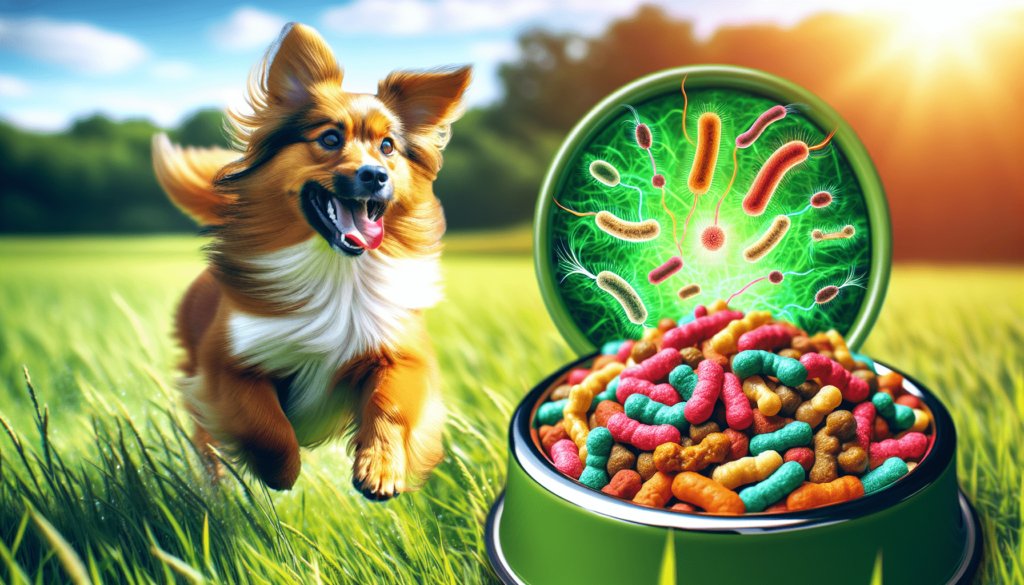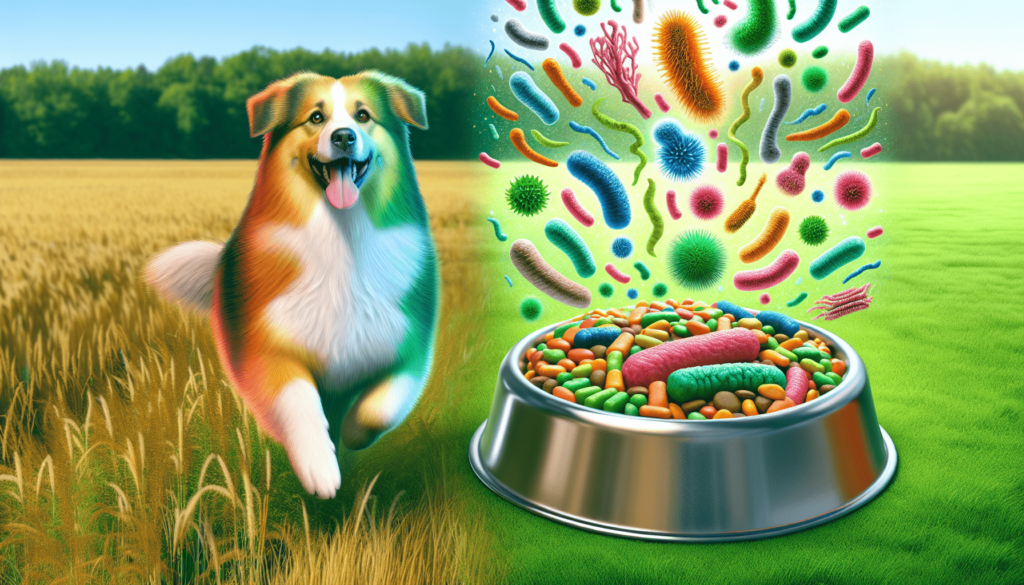Have you ever wondered what the benefits of probiotics in dog food are? You’re not alone! As a pet owner who is deeply invested in ensuring my furry friend lives their happiest, healthiest life, I’m always exploring new ways to support their well-being. Lately, it seems like probiotics are popping up everywhere—from our own health supplements to the food we feed our beloved dogs. But what exactly do they do for our pets? Let’s delve into a world that promises better digestive health, a stronger immune system, and possibly even a shinier coat for our canine companions.

Understanding Probiotics
Probiotics are live microorganisms that offer health benefits when consumed in adequate amounts. They’re often referred to as “good” or “friendly” bacteria because they help keep the gut healthy. You may already be familiar with probiotics in the context of human nutrition, where they’re celebrated for balancing gut flora and improving digestion. But can they do the same for our dogs?
The Role of Probiotics in Dogs
In dogs, probiotics work much like they do in humans. They help restore the natural balance of bacteria in a dog’s digestive tract. When this balance is disrupted—by stress, diet changes, or illness—bad bacteria can overpopulate, leading to a host of problems like diarrhea, obesity, and even mood issues. By adding probiotics to dog food, these friendly bacteria can support a healthy balance.
Benefits of Probiotics in Dog Food
Improved Digestive Health
One of the most significant advantages of probiotics in dog food is improved digestive health. By introducing beneficial bacteria, probiotics can reduce instances of diarrhea and constipation. This is especially helpful for dogs with sensitive stomachs or those who have undergone dietary changes or antibiotic treatments, which can disrupt their gut flora.
Economic Benefits
A healthy digestive system means fewer trips to the vet and less money spent on expensive treatments. Probiotics may help in preventing gastrointestinal issues, potentially saving me the heartache and expense of dealing with a sick pet.
Enhanced Immune Function
Probiotics can also bolster a dog’s immune system. A healthy gut contributes to a strong immune response, which means my dog will be better equipped to fight off common illnesses and infections. This has the added benefit of boosting overall energy levels and vitality.
Skin and Coat Health
Another fantastic benefit of probiotics is improved skin and coat health. Many dog owners, myself included, have noticed that their pets have shinier, more vibrant coats after incorporating probiotics into their diet. This glow is likely due to improved nutrient absorption and reduced inflammation.
Reduction in Allergies
Probiotics might help mitigate allergic reactions in dogs. By promoting a healthy gut flora, probiotics can reduce inflammatory responses that contribute to itching and other allergy symptoms. For dogs who suffer from food sensitivities or seasonal allergies, probiotics can be a game-changer.
How to Incorporate Probiotics into Your Dog’s Diet
Probiotic-Rich Dog Foods
Many high-quality dog food brands now offer formulas enriched with probiotics. These are convenient and provide a balanced approach, ensuring that my dog gets the right amount of probiotics with every meal. It’s important to choose a brand known for its transparency and quality ingredients.
Probiotic Supplements
If my dog’s current food doesn’t contain probiotics, I can add them through supplements. These come in various forms, including powders, capsules, and chews, making it easy to find an option that suits both my needs and my dog’s preferences. It’s advisable to consult with a vet before starting any supplement.
Homemade Dog Food and Natural Probiotics
For those who prepare homemade dog food, adding natural probiotic-rich foods like plain yogurt or kefir can also support gut health. It’s crucial, however, to ensure that any additional food is safe for dogs, avoiding any ingredients that could be harmful.

Probiotics and Dog Behavior
Impact on Mood and Anxiety
A balanced gut microbiome may influence my dog’s mood and anxiety levels. Some studies suggest a link between gut health and behavior, indicating that probiotics could help alleviate symptoms of stress and anxiety in dogs. This highlights the mind-gut connection, proving that a happy tummy might mean a happy dog.
Social Behavior
Improved gut health can also lead to better social behavior, potentially making dogs calmer and more receptive to training. This might mean fewer episodes of aggressive or anxious behavior, promoting better interaction with both humans and other animals.
Choosing the Right Probiotics
Understanding Strains and Species
Not all probiotics are the same. Different strains offer different benefits, so it’s important to select one that targets my dog’s specific needs. Some strains might be more effective for digestive health, while others could be better for enhancing immunity.
Quality and Efficacy
When choosing a probiotic, paying attention to quality is key. Reliable brands should provide detailed information on the type and amount of live bacteria in their products. Reading reviews and consulting with a vet can also guide me toward the most effective choice.
Dosage Recommendations
It’s essential to follow dosage recommendations carefully to ensure that probiotics are beneficial. Giving too much or too little could negate the benefits or even cause harm. Therefore, sticking to the suggested amount based on my dog’s size and health condition is crucial.
Addressing Common Concerns and Misunderstandings
Are Probiotics Safe for My Dog?
For most dogs, probiotics are safe and beneficial, but observing any changes in behavior or digestion after starting them is wise. If anything seems amiss, consulting a veterinarian is the best course of action.
Can Probiotics Replace Medication?
While probiotics offer numerous benefits, they aren’t a replacement for medication prescribed by a veterinarian. For specific health issues, ongoing veterinary care and vet-approved treatments are essential. Probiotics can be a supplementary addition to support overall health.
Effects of Long-term Use
Probiotics are generally safe for long-term use. However, ensuring that they align with my dog’s changing health needs over time is necessary. Continuous veterinary check-ups will help me adjust the probiotic intake as needed.
The Cost Factor
Another concern might be the cost of probiotic-rich dog food or supplements. While they can be more expensive than standard dog food, the health benefits and potential savings on vet bills make them a worthwhile investment.
Real-life Experiences and Vet Testimonials
Stories from Dog Owners
Many dog owners have shared positive experiences regarding probiotics. Reports often include fewer digestive issues, improved coat condition, and less anxiety in their pets. Hearing these stories can be encouraging, reinforcing my decision to consider probiotics.
Insights from Veterinarians
Veterinarians often recommend probiotics for specific health concerns in dogs. They attest to the potential for probiotics to enhance gastrointestinal health and reduce antibiotic-associated diarrhea. Consulting with a vet can provide personalized guidance based on my dog’s unique needs.
Conclusion
So there you have it! Probiotics in dog food offer a plethora of benefits that can contribute to a happier, healthier life for your canine companion. Whether you’re looking to improve digestion, boost the immune system, or simply ensure that your dog’s skin and coat are in top condition, probiotics may be worth considering. Always remember to consult with your vet to tailor a plan that best fits your pet’s individual needs.
Frequently Asked Questions
What are probiotics?
Probiotics are live beneficial bacteria that help maintain the natural balance of microorganisms in the gut, promoting good digestive health.
How do probiotics benefit a dog’s health?
Probiotics can improve digestion, enhance immune function, support skin and coat health, and may reduce allergies and anxiety in dogs.
Are there any side effects of giving dogs probiotics?
Generally, probiotics are safe for dogs. However, some may experience temporary digestive changes, such as mild diarrhea or gas, when first introduced to probiotics.
How can I include probiotics in my dog’s diet?
Probiotics can be included through enriched dog foods, supplements, or natural foods like plain yogurt, ensuring they’re safe and appropriate for dogs.
Are probiotics suitable for all dogs?
Most dogs can benefit from probiotics, but it’s a good idea to consult with a vet, especially if your dog has specific health issues or is taking medications.
Can probiotics replace regular vet care?
No, while probiotics can support overall health, they’re not a replacement for regular veterinary care or prescribed medications.
Incorporating probiotics into your dog’s diet could be a step toward a healthier, more vibrant life. Could it be that our pups can enjoy the same gut-boosting benefits we’re starting to appreciate in our own diets? With the right approach, it seems like the answer could very well be yes!



